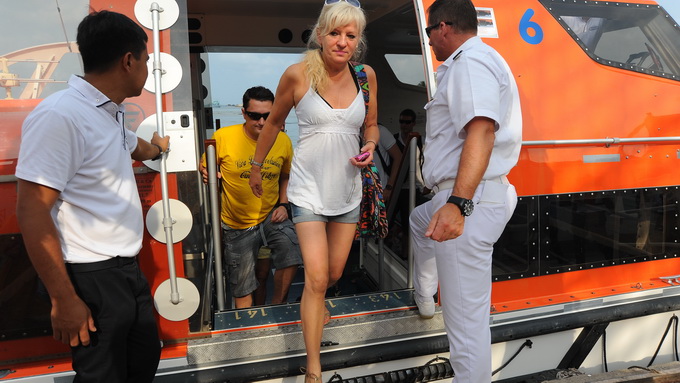A Vietnamese tourist firm has recently spent 10 hours assisting over 2,000 German travelers who arrived by sea to complete the new visa process under the new immigration procedure, as it requires as many as seven stamps, instead of one as before, to be fixed on their passports and visa forms.
>> Vietnam waives visas for tourists from seven countries On the morning of January 2, the Tan Hong Tourism Company, based in Ho Chi Minh City, received 2,318 German tourists who arrived in Vietnam aboard the 5-star cruise ship Aida Sol. Under a new immigration regulation, four stamps – one round stamp from the visa issuing office, another showing the position of the signing officer, one more showing the same position of that officer, and the other showing the word “Used” – are required for foreign tourists’ visa forms. Meanwhile, three more stamps – one for entry, another for exit and the other for stay – need to be fixed on the passports of foreign visitors. Previously, only one stamp needed to be affixed on foreign tourists’ passports, Pham Xuan Anh, a counselor of the company, said. Therefore, the company had to mobilize all its workers to assist its guests in completing the new procedure, and the process took about 10 hours, Anh said. At 3 pm on December 30, 2014, the company received a notice from the Vietnam National Administration of Tourism introducing the above new regulation of the Immigration Law starting January 1, 2015, Anh said. At that time, only 39 hours remained for the company to prepare to enforce the new rule for receiving such a large number of German travelers, who arrived at Phu My Port in the southern city of Vung Tau last Friday, he stressed. Regarding fees imposed on foreign tourists who arrive by sea, Anh said the visa fee under the new rule is US$45 per visa, while previously foreign visitors were charged only US$5 each as the fee for a sightseeing permit. In addition, under the new regulation, each of the visitors on the ship was required to obtain their personal visa, while previously only one permit was needed for all the visitors on board, Anh said. The new regulation affects not only tourists coming to Vietnam by sea but also those arriving by road, according to Nguyen Van Tran, general director of the Apex Vietnam Tourism Joint Stock Company, which specializes in serving Japanese visitors to Vietnam. “This regulation will surely affect Vietnamese tourism companies that provide travel services to foreigners,” Tran said.“Detrimental to tourist sector” In talking with Tuoi Tre (Youth) newspaper, many tourism companies said they had not been consulted or asked for their opinions on the new immigration procedure. While many countries around the world are offering more favorable conditions to foreign visitors, Vietnam’s new immigration procedure is causing difficulties both to international tourists and local travel firms. “If I had been consulted, I would absolutely have requested that the new procedure be re-considered as it is very detrimental to the tourist sector,” Apex Vietnam general director Tran said. Nguyen Huu Tho, chairman of the Vietnam Tourism Association (VITA), affirmed that he had not known about the new procedure. “I have heard complaints from a number of tourism firms about difficulties caused by the new immigration rule. We will discuss this issue at the meeting of the VITA’s executive committee on January 10 and will release our official opinion about it, “Tho said. Meanwhile, Nguyen Quy Phuong, head of the Travel Department under the Vietnam National Administration of Tourism, said the agency has yet to be asked for its opinion on the draft amendments to the Immigration Law. Phuong said he did not know about any amendment to the Law in relation to the changes to the immigration procedure until late December, when the agency received a notice from the Ministry of Public Security’s Immigration Management Department asking for enforcement of the new visa process. The new immigration procedure is a step back in the country’s immigration procedure, Phuong concluded.
Like us on Facebook or follow us on Twitter to get the latest news about Vietnam!



















































